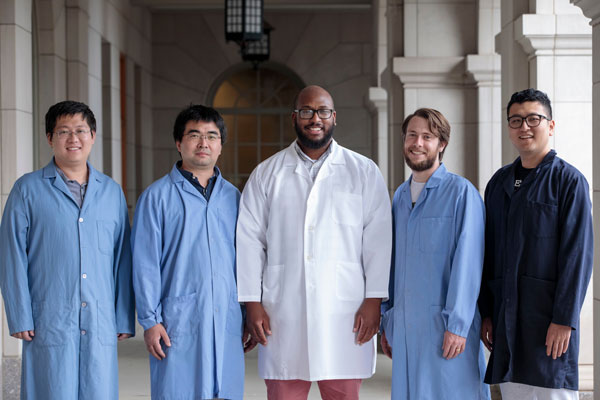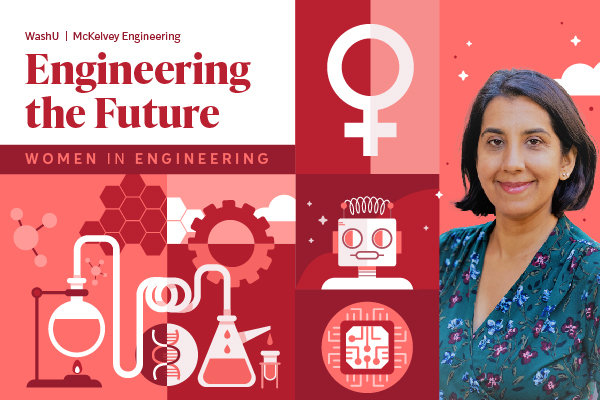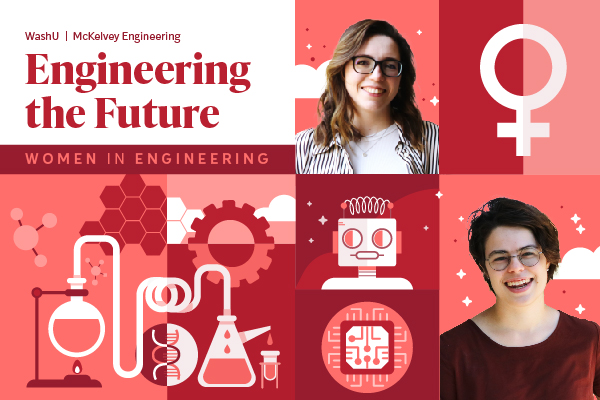A conversation with Marcus Foston
Marcus Foston, associate professor and new director of diversity initiatives for the McKelvey School of Engineering, shares what he plans to achieve in this new role

Last December, Marcus Foston, associate professor of energy, environmental & chemical engineering, was named the new director of diversity initiatives for the McKelvey School of Engineering. In this role, he will chair the McKelvey Committee on Equity, Diversity and Inclusion, leading the committee in considering all DEI issues relevant to faculty, students and staff in the school.
Foston answered a few questions about diversity at the university, his experiences in STEM and what he plans to accomplish during his tenure as chair.
What are your goals for the committee in the coming year?
I want to continue the work we were doing before. We haven’t done a formal climate survey, but we know what needs to be done. There are a lot of what I would consider easy wins: obvious problems that need to be addressed.
I want to start setting up the systems and processes that will address the issues we are aware of now and future issues in a way that won’t depend on an individual. I want this to be bigger than myself and the committee. We want to build something that’s an integral component of the mission that touches every part of the school, and simply becomes part of our culture.
What are the opportunities and challenges you expect to face?
There is a lack of diversity, particularly in engineering academia and the engineering profession. This is a huge issue, and it’s not a new issue. WashU isn’t any different.
We have the opportunity to have open conversations about equity, diversity, and inclusion in the school, and we can begin to dive into and address these issues. The fact that there is work to do means our initial efforts will likely have a large impact, and I'm excited to see it evolve.
How can members of the engineering community support you in this role?
As a school, we need to create a climate and culture where people feel a sense of belonging, safety, and membership. One thing we can do is be more willing to accept teaching moments and embrace other experiences and cultures. It takes all of us to buy in and create a more equitable and inclusive culture. The committee wants to help do this, so we need feedback. We want people to interact with us and know that we’re willing to hear from them.
Also, there are a lot of alumni and people in the St. Louis area who are interested in the work we're doing. It would be very valuable to have those people interact with some of our students, particularly our underrepresented students.
What has your experience as a Black engineer been like?
It’s not like everything has gone perfectly, but when it mattered the most I had great people around me and supporting me. I never felt that I didn’t belong or that I didn’t fit in, but I’ve also often been the only person of color in a room. I would have loved to have been in an environment that was more diverse.
When I moved to St. Louis, I didn’t know anybody. When I first came to WashU, there was a minority mentoring program that was started by Adrienne Davis, and that was one of the best experiences I had. Besides being able to get a lot of great advice, I got to meet people. There was a system and a group of mentors in place that understood the challenges I was facing. That program made me feel welcome.
What was your experience like before coming to WashU?
I was blessed with a lot of advantages that many people don’t have. By the time I got into college, there were structures in place to help people from underrepresented backgrounds; but, accessing them took a level of institutional awareness often not found in first-year students, particularly underrepresented or first-generation students.
I did all my work at Georgia Tech. I jumped around different departments, so I got to see different disciplines and interdisciplinary research there. I understood how to navigate systems. I understood how to get help. Some of my students weren't necessarily exposed to those things.
When it comes to students, we need to understand their experiences and their backgrounds and provide a framework for institutional access and support that allows them to achieve similar successful outcomes despite differences in that experience and background.
What advice do you have for students who are underrepresented in STEM?
It can often feel that you’re being overlooked or that no one cares. Maybe at one point in history that was true, but that’s not the case here and now. We want to be able to hear from everybody. We want to know you and your experiences because you, your identity, and your experiences matter. We are working hard to commit to a belief that everyone deserves equal rights and opportunity.




